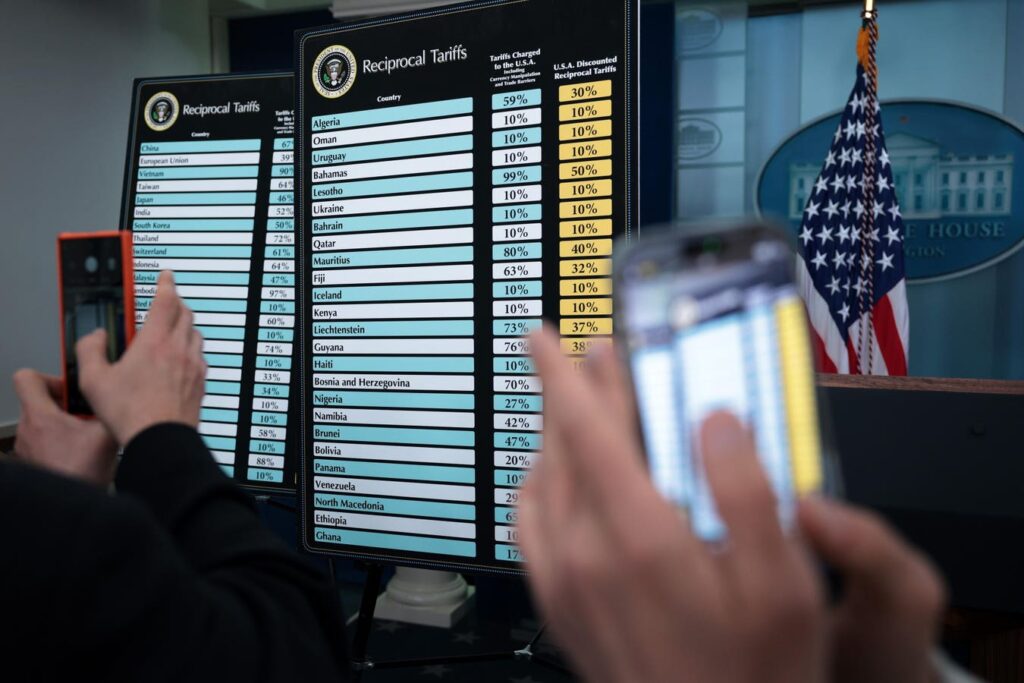WASHINGTON, DC – APRIL 02: Charts that show the “reciprocal tariffs” the U.S. is charging other … More
Getty Images
While much of the attention surrounding the Trump Administration’s tariffs focuses on multinational corporations, small businesses—those with fewer than 500 employees—make up 99.9% of U.S. businesses and will be the most impacted. They will face tighter margins and higher costs.
Their role in global trade is significant, yet their vulnerability in tariff policy discussions is often underrepresented.
According to the U.S. Census Bureau, small and medium-sized enterprises accounted for 98% of the nation’s exporters in 2021, contributing to over $413 billion in total export value. At the same time, many small firms rely on imported goods and materials for manufacturing and resale. As a result, changes in trade policy—particularly increases in tariffs—can have outsized impacts on their operations and long-term sustainability.
Given that small firms are responsible for more than a quarter of total U.S. export value, even marginal increases in trade friction can have measurable consequences for growth, hiring, and reinvestment.
Increased Costs And Narrower Margins
Unlike larger companies, which often have greater leverage to absorb price increases or restructure supply chains, small businesses typically operate with tighter margins. When tariffs are imposed on key imports such as steel, aluminum, textiles, or electronic components, those costs are passed down the line—eventually affecting pricing, production, and staffing decisions. A National Small Business Association survey found that 42% of small businesses reported increased costs as a result of tariffs, while 30% noted delays in shipments and fulfillment.
For example, a small specialty manufacturer importing machinery parts from overseas may see a 10-25% increase in cost due to tariff hikes—expenses that are not easily recouped without raising consumer prices or reducing output. In a competitive market, either option can be difficult to sustain.
Exporters Face New Headwinds
While imports are a challenge, exports are also under pressure. Small businesses engaged in exporting often face tariffs imposed by other countries in retaliation. These added barriers can dampen the competitiveness of American-made goods abroad. A 2022 study by the Congressional Research Service noted that retaliatory tariffs from trade partners during previous trade disputes affected over $120 billion in U.S. exports, with agriculture and small-scale manufacturing among the hardest hit.
Given that small firms are responsible for more than a quarter of total U.S. export value, even marginal increases in trade friction can have measurable consequences for growth, hiring, and reinvestment.
Policy Uncertainty Impacts Planning
Perhaps one of the most difficult aspects for small businesses is the unpredictability that comes with shifting trade policy. Long-term investments—whether in equipment, workforce development, or market expansion—are often delayed or scaled back amid uncertainty. For many entrepreneurs, planning for the future requires some degree of stability, and rapid changes in tariff regimes can upend even the best-laid business plans.
The Path Forward
As the U.S. continues to navigate global economic challenges, it’s critical that the small business lens is not lost in broader policy discussions. Trade policies—including tariff frameworks—should be designed with an understanding of how they affect businesses of all sizes, not just those with the resources to adapt quickly.
This includes more robust small business impact assessments, expanded export training and support, and greater engagement with industry associations that represent smaller firms. By integrating the voices and needs of small business owners into trade conversations, we can develop strategies that promote both global competitiveness and local economic resilience.
Small businesses are more than the backbone of the American economy—they are innovators, job creators, and community builders. Ensuring their continued success in a dynamic global market requires thoughtful, inclusive policy—and an acknowledgment that every tariff has a downstream impact far beyond the negotiating table.


